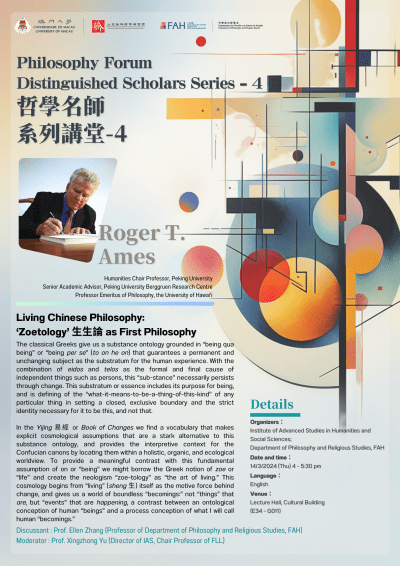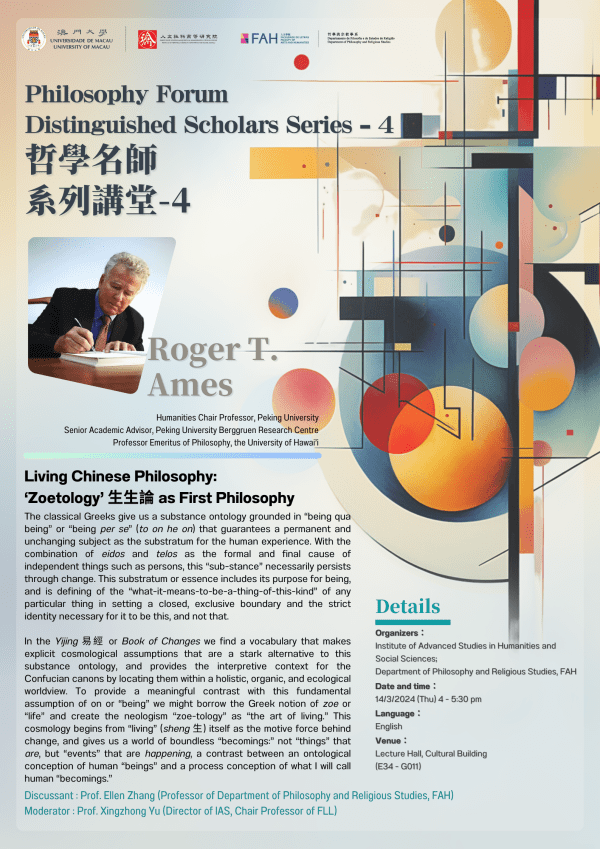【IAS】 Philosophy Forum Distinguished Scholars Series – 4: Professor Roger Ames (14 March 2024 ; 4-5:30 PM)
【高研院】哲學名師系列講堂 - 4 :安樂哲教授(2024年3月14日,下午4-5:30)

Dear Colleagues and Students,
 The Institute of Advanced Studies in Humanities and Social Sciences (IAS) cordially invites you to participate in the Philosophy Forum Distinguished Scholars Series – 4, scheduled for 14 March 2024 (Thu). We are honoured to have Professor Roger Ames, Humanities Chair Professor at Peking University, Senior Academic Advisor of the Peking University Berggruen Research Centre, and Professor Emeritus of Philosophy at the University of Hawai’i, explore the topic of “Living Chinese Philosophy: ‘Zoetology’ 生生論 as First Philosophy”.
The Institute of Advanced Studies in Humanities and Social Sciences (IAS) cordially invites you to participate in the Philosophy Forum Distinguished Scholars Series – 4, scheduled for 14 March 2024 (Thu). We are honoured to have Professor Roger Ames, Humanities Chair Professor at Peking University, Senior Academic Advisor of the Peking University Berggruen Research Centre, and Professor Emeritus of Philosophy at the University of Hawai’i, explore the topic of “Living Chinese Philosophy: ‘Zoetology’ 生生論 as First Philosophy”.
We are also delighted to have Professor Ellen Zhang from the Department of Philosophy and Religious Studies of FAH, as the discussant, and Professor Xingzhong Yu, Director of IAS and Chair Professor of FLL, as the moderator for this forum. Please find the details below:
- Title: Living Chinese Philosophy: ‘Zoetology’ 生生論 as First Philosophy
- Organizers: Institute of Advanced Studies in Humanities and Social Sciences; Department of Philosophy and Religious Studies, FAH
- Date: 14 March, 2024 (Thu)
- Time: 4-5:30 PM
- Language: English
- Venue: Lecture Hall, Cultural Building (E34 – G011)
Abstract:
The classical Greeks give us a substance ontology grounded in “being qua being” or “being per se” (to on he on) that guarantees a permanent and unchanging subject as the substratum for the human experience. With the combination of eidos and telos as the formal and final cause of independent things such as persons, this “sub-stance” necessarily persists through change. This substratum or essence includes its purpose for being, and is defining of the “what-it-means-to-be-a-thing-of-this-kind” of any particular thing in setting a closed, exclusive boundary and the strict identity necessary for it to be this, and not that.
In the Yijing 易經 or Book of Changes we find a vocabulary that makes explicit cosmological assumptions that are a stark alternative to this substance ontology, and provides the interpretive context for the Confucian canons by locating them within a holistic, organic, and ecological worldview. To provide a meaningful contrast with this fundamental assumption of on or “being” we might borrow the Greek notion of zoe or “life” and create the neologism “zoe-tology” as “the art of living.” This cosmology begins from “living” (sheng 生) itself as the motive force behind change, and gives us a world of boundless “becomings:” not “things” that are, but “events” that are happening, a contrast between an ontological conception of human “beings” and a process conception of what I will call human “becomings.”
We look forward to seeing you at this event! For more information about IAS, please visit the website of IAS at https://ias.um.edu.mo/. Should you have any questions, please do not hesitate to contact us at ias.programme@um.edu.mo.
Institute of Advanced Studies in Humanities and Social Sciences
University of Macau

